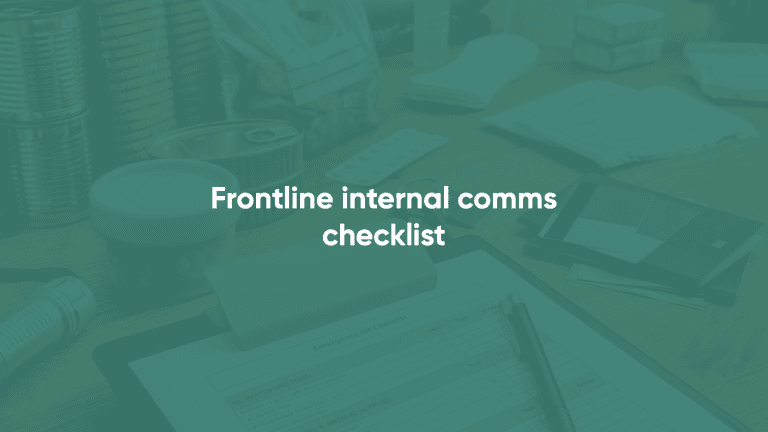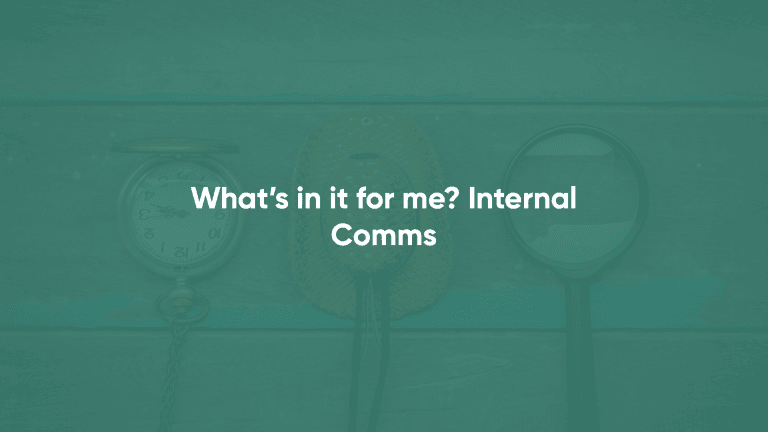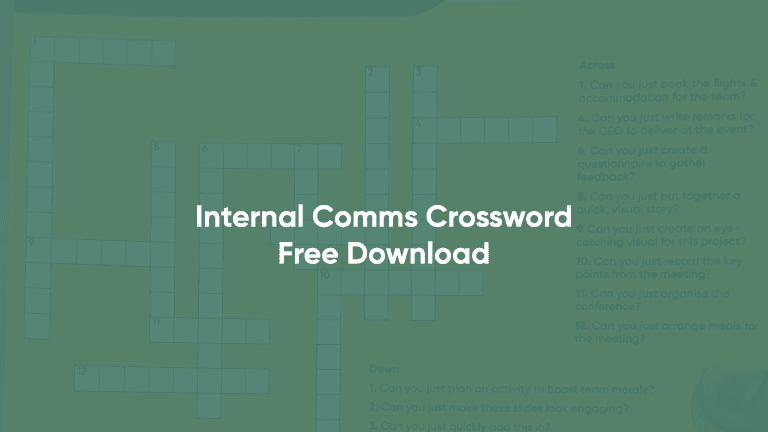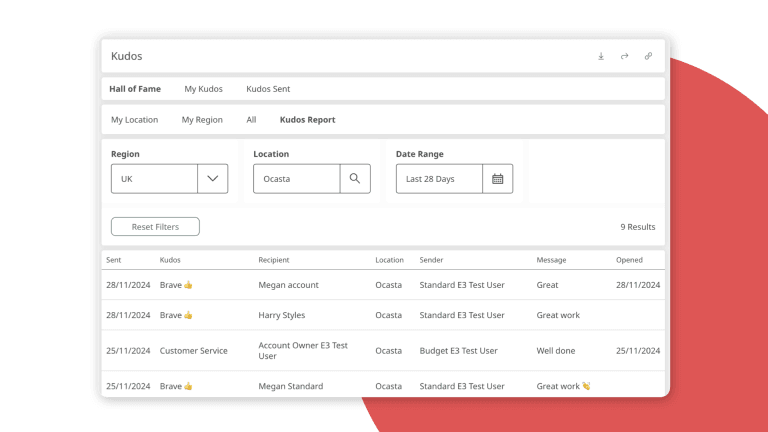As lockdown restrictions are relaxed, there comes another wave of uncertainty amongst workforces about how their jobs will change, with people getting used to more autonomy, time with their families and home comforts. We’ve created 50 different questions to get the perspective from your workforce before returning to work.
Alongside sending out a questionnaire or survey, we recommend offering some clear guidance to your workforce such as:
-
Commit to at least dates, regardless of government advice, for example: “We won’t be forcing anyone to come back to the office until at least 15th September 2020”. This will help them understand, removes uncertainty and offers long term planning.
-
Safety procedures in place, let them know what planning and actions you’re taking, so they’re confident whilst filling in the survey, and to highlight any gaps you may have missed.
-
Thanking them, with less face to face interactions, it’s vital to offer peer to peer feedback and recognition – send them a note, a short video, or an achievement.
-
Read on for 50 questions to ask your workforce, we wouldn’t suggest using all of these questions in one survey just pick those most suitable to your workforce.
Note: With our survey to the Ocasta team, we used a 😫 – 👌 scale for our own survey to make our 1-10 questions more friendly.
Questions for how your remote workers are feeling
-
On a scale of 1-10, how are you coping?
-
What is one thing we can do to make it easier for you to work?
-
What is one thing you can do to make it easier for yourself or your colleagues to work?
-
What technical challenges (conference calls, equipment etc) have you faced?
-
What challenges have you faced with your home setup?
-
Ignoring work, is there anything that we could do to help?
-
Are you struggling to keep in contact with colleagues?
-
On a scale of 1-10, do you feel like you’re having enough opportunities to catch up with friends and family?
-
Any change can be stressful, let alone a world pandemic, where would you place yourself on the following scale:
-
Flight or fight — I’m still feeling unsure and overwhelmed
-
Damage control — you’ve accepted the uncertainty and trying to cope with it
-
Recovery — you’re feeling OK and starting to improve
-
Adaptation — you’ve found new ways to make life and work easier
-
Burnout — lack of sleep, constant work or worry is affecting your health
-
-
Where would you place yourself in the following statements:
-
Shock — you realise change is coming but still aren’t sure what that means?
-
Denial — defensive energy results in a temporary improvement in your performance and mood.
-
Anger & blame — you realise that change is still happening can result in denial turning into anger and blame – ‘it’s not fair’ or ‘it’s all my fault’.
-
Bargaining and self-blame — you start to ‘bargain’ to try and prevent the change – for example by offering to do more work to make up for any areas you’re struggling with.
-
Depression & confusion — You’ve realised that change is unavoidable and feel at the lowest point in terms of energy & morale.
-
Acceptance — Hopefully, eventually change is accepted, and you’re ready to face the future.
-
Problem-solving — Having accepted change, the individual starts to plan how they will adapt to the new situation.
-
Questions for how your workforce feel your ways of working are going
-
What would a friend or family member say about our current processes or ways of working since we’ve been at home?
-
How do you feel the company has handled changing our ways of working to support you?
-
On a scale of 1-5, how well has your manager supported you recently?
-
Are there any companies who you think have handled their response to Covid-19 particularly well? Why?
-
On a scale of 1-5 ,how proud are you of the way the company has handled their response to the pandemic? Why?
-
Questions to ask office and call centre staff
-
What are your feelings about going back to the office?
-
On a scale of 1-10, how do you feel about going back to “normal” office routines?
-
On a scale of 1-10, how do you feel about having a smaller office with more opportunities to work remotely?
-
Would you rather we had more, smaller offices located throughout the country?
-
Would you consider us using a co-working space or ad-hoc meeting service?
-
How do you feel about us having no office?
-
I prefer to visit the office:
-
Daily
-
Weekly
-
Monthly
-
Quarterly
-
Never
-
-
What do you miss most about the office?
-
What aren’t you missing about the office?
-
How should we phase the return to the office?
Survey questions for field workers before returning to work
-
What parts of your work would you feel comfortable doing?
-
Do you feel like you’ve received adequate training for your return?
-
List three things that would make you feel safer.
-
What’s one piece of advice you’d share with your colleagues?
-
On a scale of 1-10, how do you feel about going back to “normal” work routines? Why?
Retail workers
-
What’s your number one concern before we reopen?
-
If you were to give a colleague one piece of advice before returning to work, what would it be?
-
Is there any training you feel is missing before we reopen?
-
Are there any essential items you need to feel safe at work?
-
On a scale of 1-5, how confident do you feel about how to get support should you need it?
Working hours and routine
-
Which of the following do you agree with? Our current working schedule has:
-
Allowed me to adjust to working from home
-
Mostly works but at times I’ve needed more flexibility
-
Not supported me working from home
-
Other (add a note)
-
-
How have your working hours changed since working from home?
-
Are any outside of work challenges (school closures, caring for relatives) impacting how you’re working?
-
Please complete the sentence: I’m struggling to …
-
Please complete the sentence: I’m loving that …
Culture
-
What adverse effects do you think WFH could have to the culture of where you work?
-
Can you suggest any other ways that working culture can be retained, remotely or otherwise?
-
As an employer, should we try to increase the regularity of ‘all staff’ social activities, allowing for any social distancing best practices?
-
With regards to mixing WFH and office time, would you prefer an agreed schedule or remain flexible?
-
Facebook are proposing that where you live should in part determine your salary due to cities being more expensive than suburbs, do you think this is fair?
Wrap up questions
-
Is there anyone you’d like to shout out for making your WFH experience that little bit better?
-
Confidentially; is there anyone on the team you’re worried about that could use some extra support?
-
Do you have a family member or friend who you’d like us to thank for how they’ve been helping with the coronavirus pandemic?
-
All things considered; what good things have you found or learned during this time?
-
Is there something else you’d hoped we’d asked in this survey?
Want to learn the real frustrations your employees have? Download our free guide:
-





